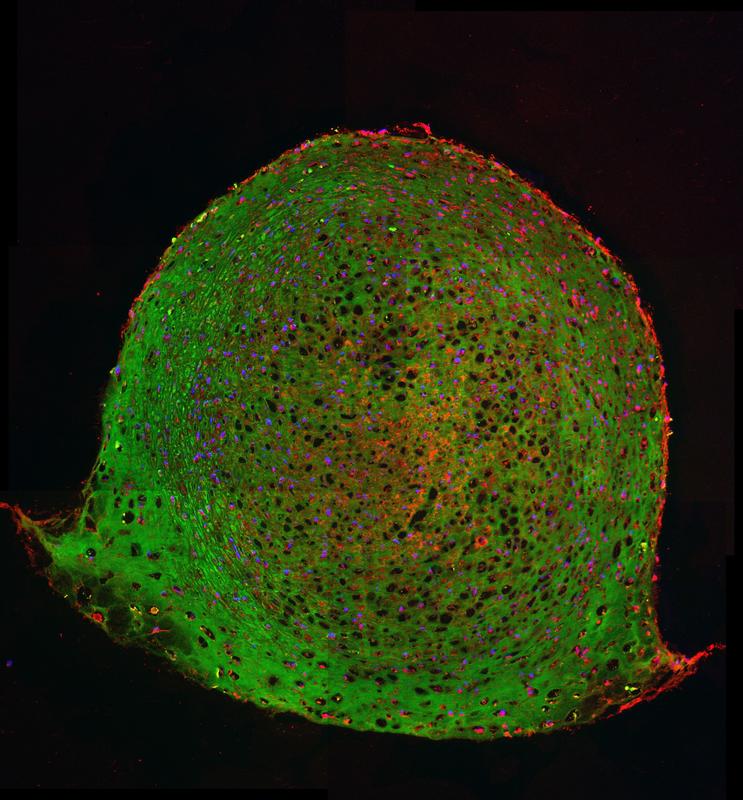Doing More with Less: Stem Cells Regulate Their Fate by Altering Their Stiffness

Immunofluorescence staining of matrix proteins in engineered cartilage Source: Institut für Makromolekulare Chemie
While it is known that this condensation step is important for skeletal development the exact role it plays in formation of bone and cartilage is not understood. A team led by Prof. Dr. Prasad Shastri and Dr. Melika Sarem of the Institute for Macromolecular Chemistry at the University of Freiburg present evidence for autonomous control of chondrogenesis in MSCs. These findings are published in the journal “Stem Cell Research & Therapy“.
They discovered that reducing the number of cells participating in condensation process leads to the activation of an intrinsic differentiation program. This prompts MSCs to become cartilage cells even in absence of chondro-inductive growth factors irrespective of donor age and sex. Sarem and Shastri further identified that two cell-membrane proteins, Caveolin-1 and N-Cadherin are differentially regulated during the condensation step and function as interactive forces like a Yin-Yang of chondrogenic differentiation.
“The fact that we need lesser cells to create better quality tissue is extremely exciting as it opens new avenues for stem cell therapies” summarizes Sarem.
In collaboration with Dr. Oliver Otto, at the University of Greifswald, the Freiburg researchers demonstrated that the chondrogenic potential of MSCs correlates with emergence of a stiffer phenotype and increase in cell size. Their findings allude to a hitherto unknown mechanobiology paradigm in MSC differentiation.
“Since MSCs harvested from adult bone marrow are a heterogeneous population of cells and their ability to undergo differentiation into cartilage or bone cells varies from donor to donor, our findings have significant implication for MSC-based strategies for engineering cartilage and bone tissue,” explains Shastri.
Prasad Shastri is the Professor of Biofunctional Macromolecular Chemistry at the Institute for Macromolecular Chemistry and the Professor of Cell Signalling Environments in the Cluster of Excellence BIOSS Centre for Biological Signalling Studies at the University of Freiburg.
Original publication:
Sarem, M., Otto, O., Tanaka, S., Shastri, V. P. (2019): Cell number in mesenchymal stem cell aggregates dictates cell stiffness an chondrogenesis. In: Stem Cell Research & Therapy. DOI: 10.1186/s13287-018-1103-y
Caption:
Immunofluorescence staining of matrix proteins in engineered cartilage
Contact:
Prof. Dr. Prasad Shastri
Institut für Makromolekulare Chemie & BIOSS Centre for Biological Signalling Studies
University of Freiburg
Tel.: 0761/203-6271
E-Mail: prasad.shastri@makro.uni-freiburg.de
https://www.pr.uni-freiburg.de/pm-en/press-releases-2018/doing-more-with-less?se…
Media Contact
All latest news from the category: Life Sciences and Chemistry
Articles and reports from the Life Sciences and chemistry area deal with applied and basic research into modern biology, chemistry and human medicine.
Valuable information can be found on a range of life sciences fields including bacteriology, biochemistry, bionics, bioinformatics, biophysics, biotechnology, genetics, geobotany, human biology, marine biology, microbiology, molecular biology, cellular biology, zoology, bioinorganic chemistry, microchemistry and environmental chemistry.
Newest articles

NASA: Mystery of life’s handedness deepens
The mystery of why life uses molecules with specific orientations has deepened with a NASA-funded discovery that RNA — a key molecule thought to have potentially held the instructions for…

What are the effects of historic lithium mining on water quality?
Study reveals low levels of common contaminants but high levels of other elements in waters associated with an abandoned lithium mine. Lithium ore and mining waste from a historic lithium…

Quantum-inspired design boosts efficiency of heat-to-electricity conversion
Rice engineers take unconventional route to improving thermophotovoltaic systems. Researchers at Rice University have found a new way to improve a key element of thermophotovoltaic (TPV) systems, which convert heat…



